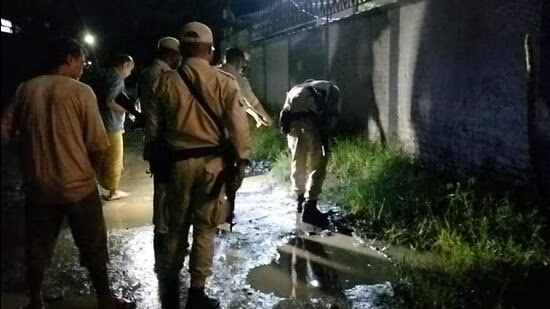Rich Tributes Paid to Lamyanba Hijam Irabot: Honoring a Legacy of Revolutionary Leadership
Summary of the News
Lamyanba Hijam Irabot, a legendary revolutionary figure in Manipur, was commemorated with rich tributes in various events across the state. Irabot, known for his dedication to social reform, political leadership, and anti-colonial activism, remains an enduring symbol of resistance and progressive change. His 127th birth anniversary saw speeches and cultural performances honoring his contributions to shaping Manipur’s socio-political landscape.
Who Was Lamyanba Hijam Irabot? Understanding the Revolutionary Legacy
A Revolutionary Leader with a Vision
Lamyanba Hijam Irabot, often referred to as the “Father of the Manipuri Revolution,” was not just a politician or a reformer. He was a visionary who fought tirelessly against colonialism, class oppression, and social inequality. Born in 1896, Irabot’s life and works continue to inspire generations of Manipuris and activists across India.
But what makes him stand out from other revolutionary leaders of his time? His commitment to the cause of the underprivileged and marginalized sections of society was unwavering. Whether it was championing for farmers’ rights, standing up for women, or advocating for the oppressed, Irabot believed in true equality—a concept that resonates even today in the social and political fabric of Manipur.
A Life of Political Activism
Irabot’s journey began as a student leader, and his activism gained momentum as he delved into Manipuri politics. Initially, he focused on the social reform movement, but over time, his attention shifted towards resisting British colonial rule. As a member of the Nikhil Manipuri Mahasabha, he sought to unite the people of Manipur across caste and religious lines.
Irabot played a critical role in organizing farmers and laborers, which set the stage for future agrarian movements in the region. His involvement in grassroots activism made him both loved and feared—a man of the people, but also a thorn in the side of oppressive structures.
Role in Manipur’s Political Landscape
Lamyanba Irabot’s influence extended beyond grassroots movements. He also made significant strides in the political arena of Manipur. He was instrumental in the formation of the Manipur Krishak Sabha, an organization that represented farmers and peasants. Irabot’s role in organizing farmers made him a prominent figure in the communist movement in India.
His work as a member of the Communist Party of India (CPI) reflected his belief in socialism as a means to uplift the poor and marginalized. However, his ideas and political stance were not without controversy, as his involvement in left-wing politics led to tensions with more conservative sections of society.
Despite these challenges, Irabot remained a beloved figure for the common people, and his legacy continues to live on through annual commemorations and tributes.
The Commemoration of Hijam Irabot: A Continuing Tradition
Cultural Events and Tributes
Every year, the birth anniversary of Lamyanba Hijam Irabot is marked with cultural performances, public speeches, and political discussions. These events are not just about remembering the man himself but also about reflecting on his ideals. Dance performances, poetry recitals, and musical tributes are common ways in which people celebrate Irabot’s contributions.
In 2024, his 127th birth anniversary was commemorated with a series of events aimed at both honoring his memory and educating the younger generation about his revolutionary activities. Schools, colleges, and civil society organizations held discussions about his contributions, reinforcing his role as a leader of the people.
Political Leaders’ Statements
Local political leaders in Manipur also paid their respects to Irabot, recognizing him as an indomitable figure who shaped the state’s political landscape. His work in resisting British colonial rule and advocating for farmers’ rights was particularly highlighted.
In their statements, these leaders emphasized that Irabot’s values of equality, justice, and socialism are still relevant in today’s world. His ability to unite people across different sections of society is seen as a much-needed lesson in contemporary times, where divisions seem to grow wider by the day.
Why Hijam Irabot’s Ideas Are Still Relevant Today
Socialism and Economic Equality
Irabot’s commitment to socialism wasn’t just a passing phase; it was a deeply held belief that economic equality could bring about true social justice. His work among farmers and laborers reflected his understanding that the economic foundation of society needed to change to address larger social issues.
Today, as income inequality grows in India and across the globe, Irabot’s ideas of collective ownership, fair wages, and agricultural reforms are becoming more relevant. His advocacy for the working class and marginalized communities resonates with current movements seeking economic justice.
Unity Across Divides
In a time when Manipur was marked by divisions—whether they were based on caste, class, or religion—Irabot’s efforts to unite people were groundbreaking. He saw the power in people coming together to fight common enemies, such as colonial oppression and class-based discrimination.
Modern-day conflicts in Manipur, and across India, are often fueled by identity politics and societal divisions. Irabot’s vision of unity in diversity is something contemporary leaders could draw from, using it as a foundation to build a more inclusive society.
Women’s Empowerment
Another important aspect of Irabot’s legacy is his advocacy for women’s rights. While his primary focus was on labor reforms, he also recognized that women in Manipur and across India were doubly oppressed—first by colonial forces and then by patriarchal structures within their communities.
His work in encouraging women to participate in political movements and labor organizations paved the way for more extensive women’s rights activism in Manipur. Today, the feminist movement in the state owes much to the groundwork laid by leaders like Irabot.
Challenges in Preserving Irabot’s Legacy
Dilution of His Ideals?
While Hijam Irabot’s legacy is honored every year, some argue that his revolutionary ideals have been diluted over time. His commitment to socialism and class struggle is often overshadowed by more mainstream political celebrations that focus on his resistance to colonialism, without addressing the class issues he was so passionate about.
Political Appropriation
In modern times, it’s common for political parties to appropriate historical figures for their gain, and Irabot is no exception. While he was a socialist who fought for the rights of the working class, today, various political factions claim him as their own, often ignoring the more radical aspects of his ideology.
As such, it becomes essential for scholars and activists to keep Irabot’s legacy alive in its truest form, ensuring that future generations understand the full scope of his revolutionary work.
FAQs
- Who was Hijam Irabot?
Hijam Irabot was a revolutionary leader from Manipur who fought against colonialism and class oppression, advocating for the rights of farmers, laborers, and women. - What is the significance of his birth anniversary?
His birth anniversary is celebrated to honor his contributions to Manipur’s social and political landscape, as well as to educate people about his legacy. - What were his main political beliefs?
Irabot was a staunch believer in socialism and economic equality, advocating for the working class and marginalized communities. - How is Irabot remembered today?
He is remembered through cultural events, public speeches, and political discussions, particularly in Manipur, where his ideals continue to inspire. - Why is Irabot still relevant today?
Irabot’s ideals of socialism, economic justice, and unity across divisions remain relevant in addressing modern-day issues like income inequality and societal divisions.



